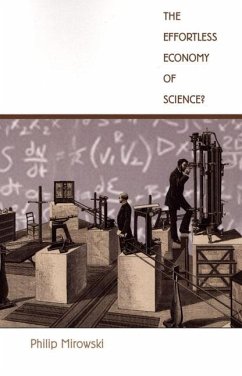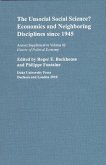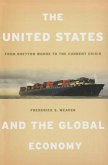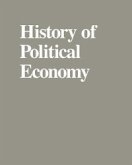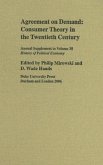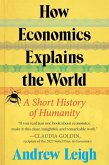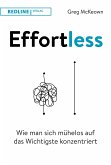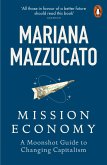Philip Mirowski
The Effortless Economy of Science?
Philip Mirowski
The Effortless Economy of Science?
- Gebundenes Buch
- Merkliste
- Auf die Merkliste
- Bewerten Bewerten
- Teilen
- Produkt teilen
- Produkterinnerung
- Produkterinnerung
A compilation of essays by the author that reveals the value for science studies of examples arising within the history of economics.
Andere Kunden interessierten sich auch für
![The Unsocial Social Science?: Economics and Neighboring Disciplines Since 1945 The Unsocial Social Science?: Economics and Neighboring Disciplines Since 1945]() The Unsocial Social Science?: Economics and Neighboring Disciplines Since 194566,99 €
The Unsocial Social Science?: Economics and Neighboring Disciplines Since 194566,99 €![The United States and the Global Economy The United States and the Global Economy]() Frederick S WeaverThe United States and the Global Economy68,99 €
Frederick S WeaverThe United States and the Global Economy68,99 €![Hope 34 Future of the History Hope 34 Future of the History]() E. Roy Weintraub (ed.)Hope 34 Future of the History66,99 €
E. Roy Weintraub (ed.)Hope 34 Future of the History66,99 €![Agreement on Demand: Consumer Theory in the Twentieth Century Agreement on Demand: Consumer Theory in the Twentieth Century]() Agreement on Demand: Consumer Theory in the Twentieth Century66,99 €
Agreement on Demand: Consumer Theory in the Twentieth Century66,99 €![How Economics Explains the World How Economics Explains the World]() Andrew LeighHow Economics Explains the World18,39 €
Andrew LeighHow Economics Explains the World18,39 €![Effortless Effortless]() Greg McKeownEffortless18,00 €
Greg McKeownEffortless18,00 €![Mission Economy Mission Economy]() Mariana MazzucatoMission Economy10,99 €
Mariana MazzucatoMission Economy10,99 €-
-
-
A compilation of essays by the author that reveals the value for science studies of examples arising within the history of economics.
Hinweis: Dieser Artikel kann nur an eine deutsche Lieferadresse ausgeliefert werden.
Hinweis: Dieser Artikel kann nur an eine deutsche Lieferadresse ausgeliefert werden.
Produktdetails
- Produktdetails
- Verlag: Duke University Press
- Seitenzahl: 472
- Erscheinungstermin: 21. Juli 2004
- Englisch
- Abmessung: 243mm x 158mm x 32mm
- Gewicht: 771g
- ISBN-13: 9780822333104
- ISBN-10: 0822333104
- Artikelnr.: 22079564
- Herstellerkennzeichnung
- Libri GmbH
- Europaallee 1
- 36244 Bad Hersfeld
- gpsr@libri.de
- Verlag: Duke University Press
- Seitenzahl: 472
- Erscheinungstermin: 21. Juli 2004
- Englisch
- Abmessung: 243mm x 158mm x 32mm
- Gewicht: 771g
- ISBN-13: 9780822333104
- ISBN-10: 0822333104
- Artikelnr.: 22079564
- Herstellerkennzeichnung
- Libri GmbH
- Europaallee 1
- 36244 Bad Hersfeld
- gpsr@libri.de
Philip Mirowski is Carl Koch Professor of Economics at the University of Notre Dame. Among his books are Machine Dreams: Economics Becomes a Cyborg Science; More Heat Than Light: Economics as Social Physics, Physics as Nature’s Economics; and Science Bought and Sold: Essays in the Economics of Science (coedited with Esther-Mirjam Sent).
Part One From Economics to Science Studies 1
Introduction: Cracks, Hidden Passageways, and False Bottoms: The Economics
of Science and Social Studies Economics 3
1. Confessions of an Aging Enfant Terrible 37
Part Two Science as an Economic Phenomenon 51
2. On Playing the Economics Card in the Philosophy of Science: Why It
Didn’t Work for Michael Polanyi 53
3. Economics, Science, and Knowledge: Polanyi versus Hayek 72
4. What’s Kuhn Got to Do with It? 85
5. The Economic Consequences of Philip Kitcher 97
6. Re-engineering Scientific Credit in the Era of Globalized Information
Economy 116
Part Three Rigorous Quantitative Measurement as a Social Phenomenon 145
7. Looking for Those Natural Numbers: Dimensionless Constants and the Idea
of Natural Measurement 147
8. A Visible Hand in the Marketplace of Ideas: Precision Measurement as
Arbitrage 169
Part Four Is Econometrics an Empirical Endeavor? 193
9. Brewing, Betting, and Rationality in London, 1822-1844: What
Econometrics Can and Cannot Tell Us about Historical Actors 195
10. Why Econometricians Don’t Replicate (Although They Do Reproduce) 213
11. From Mandlebrot to Chaos in Economic Theory 229
12. Mandelbrot’s Economics after a Quarter-Century 251
13. The Collected Economic Works of William Thomas Thornton: An
Introduction and Justification 273
14. Smooth Operator: How Marshall’s Demand and Supply-Curves Made
Neoclassicism Safe for Public Consumption but Unfit for Science 335
15. Problems in the Paternity of Econometrics: Harry Ludwell Moore 357
16. Refusing the Gift 376
Notes 401
References 427
Index 459
Introduction: Cracks, Hidden Passageways, and False Bottoms: The Economics
of Science and Social Studies Economics 3
1. Confessions of an Aging Enfant Terrible 37
Part Two Science as an Economic Phenomenon 51
2. On Playing the Economics Card in the Philosophy of Science: Why It
Didn’t Work for Michael Polanyi 53
3. Economics, Science, and Knowledge: Polanyi versus Hayek 72
4. What’s Kuhn Got to Do with It? 85
5. The Economic Consequences of Philip Kitcher 97
6. Re-engineering Scientific Credit in the Era of Globalized Information
Economy 116
Part Three Rigorous Quantitative Measurement as a Social Phenomenon 145
7. Looking for Those Natural Numbers: Dimensionless Constants and the Idea
of Natural Measurement 147
8. A Visible Hand in the Marketplace of Ideas: Precision Measurement as
Arbitrage 169
Part Four Is Econometrics an Empirical Endeavor? 193
9. Brewing, Betting, and Rationality in London, 1822-1844: What
Econometrics Can and Cannot Tell Us about Historical Actors 195
10. Why Econometricians Don’t Replicate (Although They Do Reproduce) 213
11. From Mandlebrot to Chaos in Economic Theory 229
12. Mandelbrot’s Economics after a Quarter-Century 251
13. The Collected Economic Works of William Thomas Thornton: An
Introduction and Justification 273
14. Smooth Operator: How Marshall’s Demand and Supply-Curves Made
Neoclassicism Safe for Public Consumption but Unfit for Science 335
15. Problems in the Paternity of Econometrics: Harry Ludwell Moore 357
16. Refusing the Gift 376
Notes 401
References 427
Index 459
Part One From Economics to Science Studies 1
Introduction: Cracks, Hidden Passageways, and False Bottoms: The Economics
of Science and Social Studies Economics 3
1. Confessions of an Aging Enfant Terrible 37
Part Two Science as an Economic Phenomenon 51
2. On Playing the Economics Card in the Philosophy of Science: Why It
Didn’t Work for Michael Polanyi 53
3. Economics, Science, and Knowledge: Polanyi versus Hayek 72
4. What’s Kuhn Got to Do with It? 85
5. The Economic Consequences of Philip Kitcher 97
6. Re-engineering Scientific Credit in the Era of Globalized Information
Economy 116
Part Three Rigorous Quantitative Measurement as a Social Phenomenon 145
7. Looking for Those Natural Numbers: Dimensionless Constants and the Idea
of Natural Measurement 147
8. A Visible Hand in the Marketplace of Ideas: Precision Measurement as
Arbitrage 169
Part Four Is Econometrics an Empirical Endeavor? 193
9. Brewing, Betting, and Rationality in London, 1822-1844: What
Econometrics Can and Cannot Tell Us about Historical Actors 195
10. Why Econometricians Don’t Replicate (Although They Do Reproduce) 213
11. From Mandlebrot to Chaos in Economic Theory 229
12. Mandelbrot’s Economics after a Quarter-Century 251
13. The Collected Economic Works of William Thomas Thornton: An
Introduction and Justification 273
14. Smooth Operator: How Marshall’s Demand and Supply-Curves Made
Neoclassicism Safe for Public Consumption but Unfit for Science 335
15. Problems in the Paternity of Econometrics: Harry Ludwell Moore 357
16. Refusing the Gift 376
Notes 401
References 427
Index 459
Introduction: Cracks, Hidden Passageways, and False Bottoms: The Economics
of Science and Social Studies Economics 3
1. Confessions of an Aging Enfant Terrible 37
Part Two Science as an Economic Phenomenon 51
2. On Playing the Economics Card in the Philosophy of Science: Why It
Didn’t Work for Michael Polanyi 53
3. Economics, Science, and Knowledge: Polanyi versus Hayek 72
4. What’s Kuhn Got to Do with It? 85
5. The Economic Consequences of Philip Kitcher 97
6. Re-engineering Scientific Credit in the Era of Globalized Information
Economy 116
Part Three Rigorous Quantitative Measurement as a Social Phenomenon 145
7. Looking for Those Natural Numbers: Dimensionless Constants and the Idea
of Natural Measurement 147
8. A Visible Hand in the Marketplace of Ideas: Precision Measurement as
Arbitrage 169
Part Four Is Econometrics an Empirical Endeavor? 193
9. Brewing, Betting, and Rationality in London, 1822-1844: What
Econometrics Can and Cannot Tell Us about Historical Actors 195
10. Why Econometricians Don’t Replicate (Although They Do Reproduce) 213
11. From Mandlebrot to Chaos in Economic Theory 229
12. Mandelbrot’s Economics after a Quarter-Century 251
13. The Collected Economic Works of William Thomas Thornton: An
Introduction and Justification 273
14. Smooth Operator: How Marshall’s Demand and Supply-Curves Made
Neoclassicism Safe for Public Consumption but Unfit for Science 335
15. Problems in the Paternity of Econometrics: Harry Ludwell Moore 357
16. Refusing the Gift 376
Notes 401
References 427
Index 459

